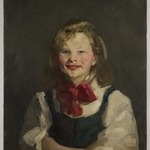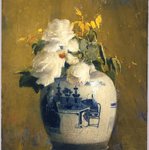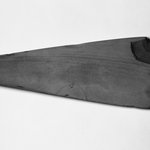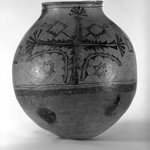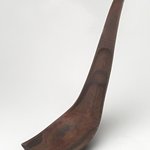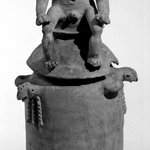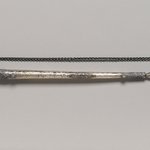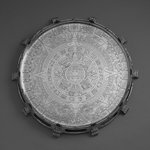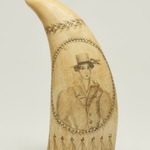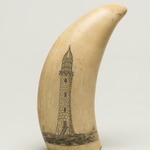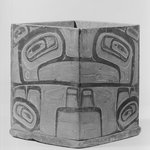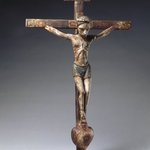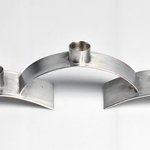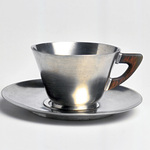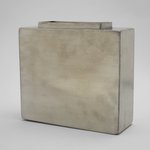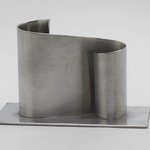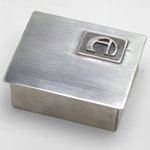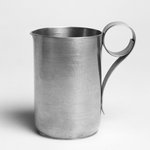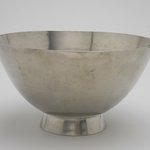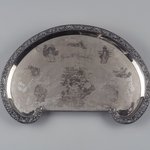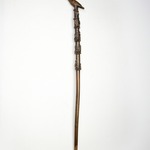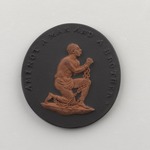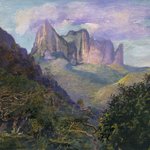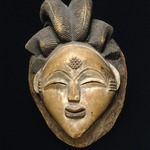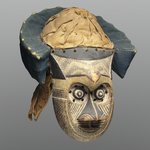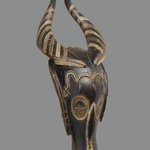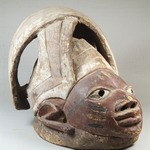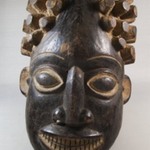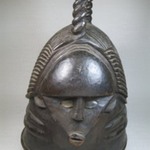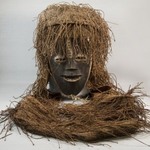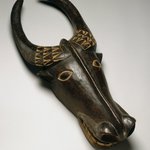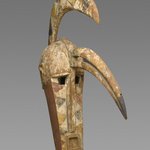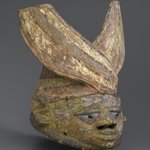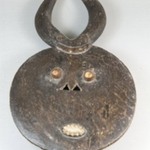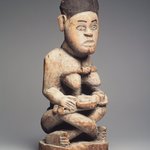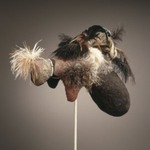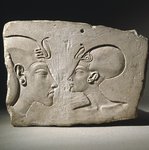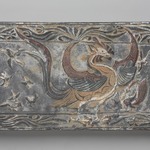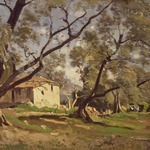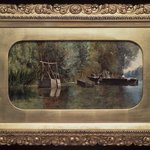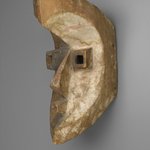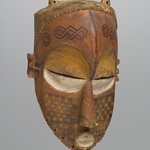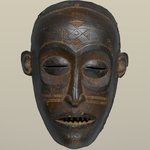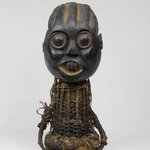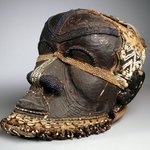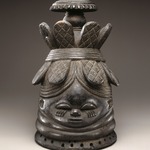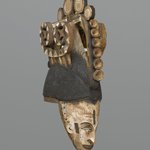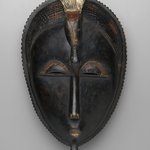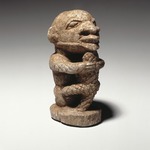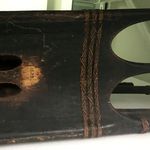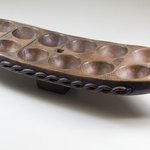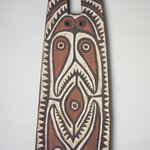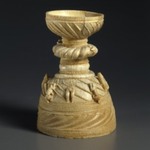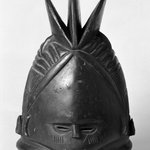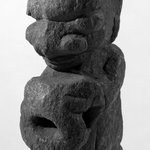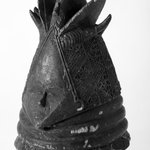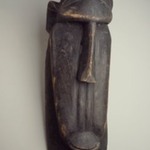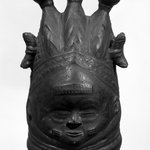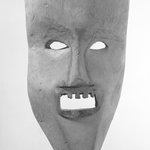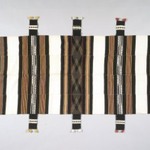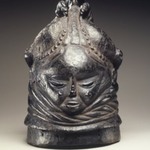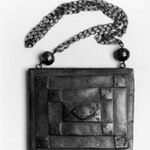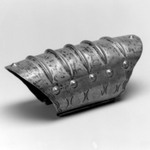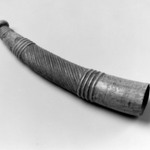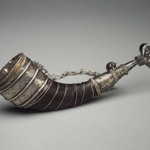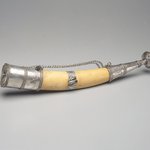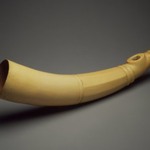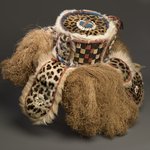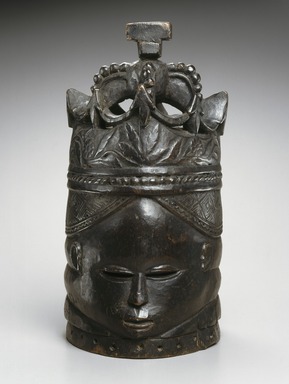

Vani Sona (ca. 1885–1951). Sande society mask (sowei), 20th century. Wood, pigment, 16 x 7 3/4 x 10 1/4 in. (40.6 x 19.7 x 26 cm). Brooklyn Museum, Robert B. Woodward Memorial Fund and Gift of Arturo and Paul Peralta-Ramos, by exchange, 69.39.2. Creative Commons-BY (Photo: Brooklyn Museum, 69.39.2_edited_SL1.jpg)
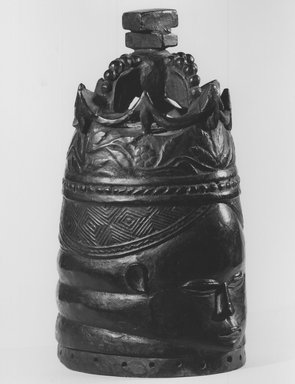
Vani Sona (ca. 1885–1951). Sande society mask (sowei), 20th century. Wood, pigment, 16 x 7 3/4 x 10 1/4 in. (40.6 x 19.7 x 26 cm). Brooklyn Museum, Robert B. Woodward Memorial Fund and Gift of Arturo and Paul Peralta-Ramos, by exchange, 69.39.2. Creative Commons-BY (Photo: Brooklyn Museum, CUR.69.39.2_print_threequarter_bw.jpg)
Sande society mask (sowei)
Arts of Africa
About this Brooklyn Icon
The Brooklyn Museum is commemorating its 200th anniversary by spotlighting 200 standout objects in its encyclopedic collection.
This sowei mask, also called a helmet mask, was a key element in the initiation ceremony of the secret, all-woman Sande society. Worn on top of the head as part of a masquerade, the mask was attached to a costume made of blackened raffia fibers and cloth, concealing the face and body. All girls were initiated into the society, and the ceremony was a crucial step in transitioning them into womanhood. The Sande society is a rare example of a group in which the masquerade tradition is controlled exclusively by women, highlighting their extraordinary social position in their communities.
In its original context, this masquerade represents a water spirit emanating from the bottom of rivers and lakes. It is activated through dance and accompanied by musicians and attendants to teach female initiates about morality and ways of living. The mask’s blackened patina, downcast eyes (suggesting humility), small demure mouth (suggesting caution when using one's words—not to gossip), and elaborate coiffure represent the ideal woman, whom the initiates should strive to become.
The Brooklyn Museum is commemorating its 200th anniversary by spotlighting 200 standout objects in its encyclopedic collection.
This sowei mask, also called a helmet mask, was a key element in the initiation ceremony of the secret, all-woman Sande society. Worn on top of the head as part of a masquerade, the mask was attached to a costume made of blackened raffia fibers and cloth, concealing the face and body. All girls were initiated into the society, and the ceremony was a crucial step in transitioning them into womanhood. The Sande society is a rare example of a group in which the masquerade tradition is controlled exclusively by women, highlighting their extraordinary social position in their communities.
In its original context, this masquerade represents a water spirit emanating from the bottom of rivers and lakes. It is activated through dance and accompanied by musicians and attendants to teach female initiates about morality and ways of living. The mask’s blackened patina, downcast eyes (suggesting humility), small demure mouth (suggesting caution when using one's words—not to gossip), and elaborate coiffure represent the ideal woman, whom the initiates should strive to become.
ARTIST
Vani Sona, ca. 1885–1951
CULTURE
Mende
MEDIUM
Wood, pigment
DATES
20th century
DIMENSIONS
16 x 7 3/4 x 10 1/4 in. (40.6 x 19.7 x 26 cm) (show scale)



COLLECTIONS
Arts of Africa
ACCESSION NUMBER
69.39.2
CREDIT LINE
Robert B. Woodward Memorial Fund and Gift of Arturo and Paul Peralta-Ramos, by exchange
CATALOGUE DESCRIPTION
Female with European style crown as headdress. Bulging forehead with features clustered in bottom half of face. Large coffee bean eyes with slits, small nose and mouth. Plump ringed neck, small flat ears. Hair is indicated by relief diamond pattern. Crown has flower and leaf pattern surmounted by four bridges joined to a central knob. Holes around bottom of mask for attachment of costume. Crown headress supposedly taken from coins of Queen Victoria.
Condition: Excellent; scattered small nicks all over, rim crack above right ear and at back left of crown.
EXHIBITIONS
MUSEUM LOCATION
This item is not on view
CAPTION
Vani Sona (ca. 1885–1951). Sande society mask (sowei), 20th century. Wood, pigment, 16 x 7 3/4 x 10 1/4 in. (40.6 x 19.7 x 26 cm). Brooklyn Museum, Robert B. Woodward Memorial Fund and Gift of Arturo and Paul Peralta-Ramos, by exchange, 69.39.2. Creative Commons-BY (Photo: Brooklyn Museum, 69.39.2_edited_SL1.jpg)
IMAGE
overall, 69.39.2_edited_SL1.jpg. Brooklyn Museum photograph
"CUR" at the beginning of an image file name means that the image was created by a curatorial staff member. These study images may be digital point-and-shoot photographs, when we don\'t yet have high-quality studio photography, or they may be scans of older negatives, slides, or photographic prints, providing historical documentation of the object.
RIGHTS STATEMENT
Creative Commons-BY
You may download and use Brooklyn Museum images of this three-dimensional work in accordance with a Creative Commons license. Fair use, as understood under the United States Copyright Act, may also apply.
Please include caption information from this page and credit the Brooklyn Museum. If you need a high resolution file, please fill out our online application form (charges apply).
For further information about copyright, we recommend resources at the United States Library of Congress, Cornell University, Copyright and Cultural Institutions: Guidelines for U.S. Libraries, Archives, and Museums, and Copyright Watch.
For more information about the Museum's rights project, including how rights types are assigned, please see our blog posts on copyright.
If you have any information regarding this work and rights to it, please contact copyright@brooklynmuseum.org.
RECORD COMPLETENESS
Not every record you will find here is complete. More information is available for some works than for others, and some entries have been updated more recently. Records are frequently reviewed and revised, and we welcome any additional information you might have.
